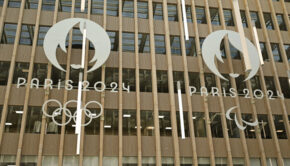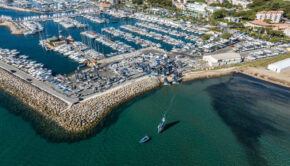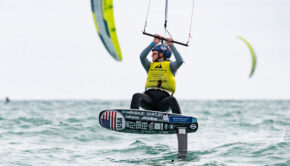Olympic Kiting: Is Short Track the way?
Published on November 23rd, 2014
by Ian MacKinnon
Kiteboarding is set to take a vital step closer to a coveted Olympics’ berth when new Short Track racing is showcased at the International Sailing Federation (ISAF) Sailing World Cup Final in Abu Dhabi on November 26-30.
Twenty of Formula kite’s elite men and women course board racers have been invited to the regatta scheduled for four days of intense racing to be staged before a representative of the International Olympic Committee (IOC).
The IOC delegate’s recommendation could be a crucial factor in deciding kiteboard racing’s inclusion in the 2020 Tokyo Games, especially with a radical shake-up in the offing over how new events – rather than sports – are chosen.
Formula kite course racing suffered the bitter disappointment in 2012 of being included in the 2016 Rio Games, only to be excluded months later. Kiteboarding fell at that hurdle because the IOC allocates just ten medal classes for sailing, leaving it to ISAF to choose the sport’s Olympic events. For kiteboarding to be included another event had to be excluded from sailing’s roster.
In 2012 a mid-year council meeting of ISAF – under which kiteboarding falls – controversially voted in kiteboarding and kicked out windsurfing’s RS:X class, though the decision was overturned at the federation’s full annual meeting later that year.
In the intervening years kiteboarding’s governing body, the International Kiteboarding Association (IKA), has continued to lobby and make presentations to the IOC. Many styles of kiteboard racing, including hydro-foiling, were presented. But the IOC “loved” the idea of Formula kite Short Track – racing on a limited field of play to appeal to spectators, television audiences and younger competitors.
As things stand, new events would only come up for addition to the Tokyo Games in 2017. But next month in Monaco the IOC executive committee is scheduled to meet and seems likely to approve key reforms that would allow greater flexibility in adopting an event-based, rather than a sport-based, approach for inclusion in the 2020 Games.
Events that measure up against 23 criteria outlined by the IOC – especially high octane ones that build excitement among spectators and can be easily televised and understood by audiences – stand a much better chance of inclusion.
The Short Track Format involves “round robin” heats of five racers who eventually all compete against one another. Heats begin with a reaching start at the windward end of the windward-leeward track, with riders completing two downwind and one upwind leg before a reach to the finish near the shoreline.
The planned 350m-by-350m boundary for the track ensures confined racing, in contrast to a key drawback to Formula kite course racing where riders can be spread out over a large area. Course board races last 12 to 15 minutes, whereas Short Track heats will be only four to five minutes’ long.
“In broadcasting terms that makes it much easier as you can have commercial breaks between heats,” says Markus Schwendtner, IKA CEO. “It sounds funny, or silly. But for the IOC it’s a big issue to make it work for television. Now in our feedback from the IOC we see a difference: there’s excitement. They want to get us in.”
The Abu Dhabi World Cup is a testing ground for “proof of concept”. With 20 competitors – including reigning Formula kite world champions Maxime Nocher and Steph Bridge – the 16 men and four women racing will race in up to 40 Short Track Format mixed heats.
The heats of days two and three will decide the top ten riders, who will race in the semi-finals on the closing day. The fastest four competitors will then fight it out in a single-race final for a prize-money pot of $20,000.
“The winner-takes-all final is important to the IOC,” says Schwendtner. “Anything which makes it an easier story to tell the media.”
Yet the innovations are not without critics among the riders who have already raced in the format at test events.
“Those riders doing well in fleet racing don’t want any change,” says Schwendtner. “Riders arguing against Short Track tend to come from a sailing background and are perhaps more conservative. Those who came from ‘freestyle’ are more open to change and like the fast-paced Short Track. But I think the vast majority is very positive.”
Top-ranked Swiss racer Astrid Berz, who is competing in Abu Dhabi, is a big backer of the Games push. “I think it would be great for us and our sport to get into the Olympics. It would change a lot about the support we get. Right now nobody cares about us. I am a member of the Swiss sailing team, but the national federation only supports Olympic classes and even though I’m ranked number one, they’re not interested in supporting me.”
Conversely Bryan Lake, the current Slalom world champion from the US, is stridently opposed to Short Track. “I personally don’t like Short Track Format because it leads to very non-strategic racing. There’s no reason our courses should be shorter than other [sailing] classes. Those classes have longer courses and go way slower. So if the IOC wants to save sailing in the Olympics, for television purposes they should have ‘freestyle’ or slalom racing.”
Source: Kiteboard Tour Asia









 We’ll keep your information safe.
We’ll keep your information safe.